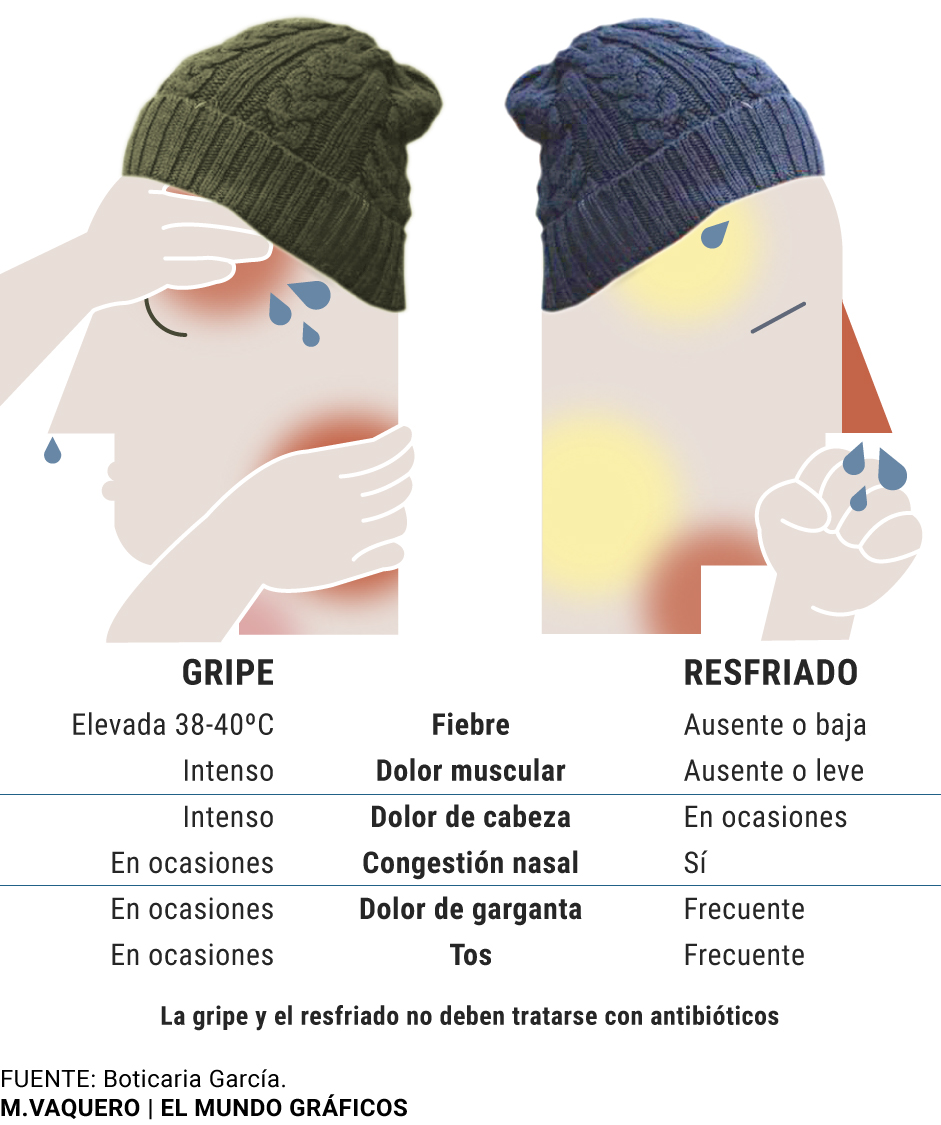- Boticaria García.All lies about the flu vaccine
- Consultorio. Send your questions to Boticaria García
It's here. True to your appointment with the month of January, the flu is here to stay. From the Flu Surveillance System (SVGE) of the Carlos III Health Institute they issue a report on their website every week on the state of the matter. This week, with 105.9 cases per 100,000 inhabitants, we already doubled the 52.6 cases that set the baseline threshold for 2019. Winter is coming ... and the flu virus, too.
What is our 'enemy virus' in 2020?
In the sentinel samples that were analyzed last week (those taken as a reference), the cod is divided between the influenza virus A (66%) and B (33.7%). This coincides with the global trend: most viruses detected are type A (69%) . Now the big question for scientists is whether the virus will mutate and how effective the vaccine will be this season. Last year the virus played to the mistake and the thing was regular, between 32 and 43%. In any case, remember that we are still in time to get vaccinated and that, despite the virus "mute", if we get the flu while vaccinated our symptoms will be milder. You can check here if you belong to one of the risk groups.
Differences between flu and cold
While the great dilemma for our scientists with respect to the flu is to find out the mutations of the virus, the common one of the mortals we ask other more prosaic questions: will I have a flu or will it be a cold? The answer is very simple: if you have the flu, you know it. While a cold is compatible with ordinary life (work, go shopping ...), the flu symptoms are more intense and leave us, using a common expression, as if a truck had passed us. Even so, being more specific, there are six symptoms that give us the key to differentiate whether our ills correspond to a flu or a cold . First, the fever. If the flu is usual to find a high fever (between 38 and 40 degrees), in the cold there is usually no fever and if it is very low. The same goes for muscle pain and headache . In the flu these two symptoms manifest themselves intensely while in the cold they are absent or mild symptoms. The fourth symptom is perhaps the most characteristic: nasal congestion . He is the saint and signs in a cold while in the flu it only appears occasionally. And this pattern is also similar in sore throat and cough, more common in the cold than in the flu. In summary, the flu is characterized by high fever and severe muscle and headaches while in the cold the kings of the party are mucus, cough and sore throat.
How to prevent the flu and the cold?
To avoid contagion, the main measures proposed by the Spanish Society of Family and Community Medicine are four: 1. Wash your hands frequently with soap or disinfectant solutions. 2. Cover your mouth and nose when you cough or sneeze. Important! Never by hand because this favors the transmission of the virus: it uses disposable tissues or the inside of the elbow. Yes, even if it is orthopedic, the inside of the elbow is the safest option. 3. Avoid direct contact with the sick and avoid sharing their utensils. 4. Ventilate rooms and clean more frequently objects that may be contaminated. Everything sounds very easy but ... do we do it?
If I already have a cold or flu ... what do I take?
The famous "flu drugs" are medications that can improve flu and cold symptoms such as headache or nasal congestion. The most popular include combinations of analgesics and antipyretic agents (such as acetaminophen or ibuprofen) with antihistamines and decongestants (such as chlorphenamine or phenylephrine). The combinations and formats are endless: envelopes, capsules, syrups, inhalers ... even in lollipop format! It is important to remember that both 1,000 mg paracetamol and 600 mg ibuprofen need a medical prescription. But do not spread panic! The lower doses may be equally effective in fighting the symptoms of the flu and the cold. Ask your pharmacist what are the most appropriate options in your case and remember that the fact that a medication does not need a prescription does not imply that we should take it lightly. Many flu, for example, are not indicated in hypertensive people.
Flu and antibiotics: war is still open
It is essential to end with a wake-up call about the use of antibiotics. Today, many people with the flu and cold continue to go to medical offices or pharmacies requesting antibiotics. And sometimes very insistently. Being of viral origin, using antibiotics for influenza or cold not only is not effective but also contributes to worsening the serious global problem of microbial resistance . Some of them are no longer effective and WHO warns us that this is one of the biggest threats to global health. Before the flu, flu, not antibiotics. And I insist: consult your pharmacist. We are happy to help you.
According to the criteria of The Trust Project
Know more- Flu
- Vaccinations
HealthThe flu exceeds the epidemic threshold in Euskadi for the first time
Health The office of Boticaria García: "To say that moving the tongue prevents Alzheimer's is coming too high"
Savings and Consumption Creative shavings to sell beyond Christmas: vermouth, fried potato, foie or carrot cake

